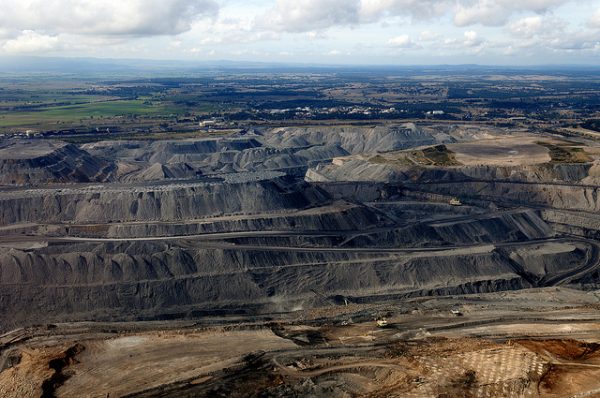
With a group of coal miners standing behind him, President Donald Trump signed an executive order in his first 100 days reversing Obama-era climate change policies and claimed that he would be bringing back coal and putting miners to work. With this move, Trump has tapped into the concerns of rural communities with economies dominated by resource extraction. Yet, can or will coal mining jobs come back, and will this lead to economic and social development in places like Appalachia?
The loss of mining jobs in the U.S. is largely due to increasing mechanization and other labor-cutting management practices –not the result of environmental protections. Thus, placing the blame on climate change policies is an unfounded, but typical, argument used to scapegoat environmentalists rather than industry or changes in the global economy.
- Jo-Anne Everingham. 2016. “Transformation of Rural Society and Environments by Extraction of Mineral and Energy Resources.” Pp. 272–84 in Routledge International Handbook of Rural Studies, edited by M. Shucksmith and D. L. Brown. New York, NY: Routledge.
- Todd L. Matthews. 2010. “The Enduring Conflict of ‘Jobs Versus the Environment’: Local Pollution Havens as an Integrative Empirical Measure of Economy Versus Environment.” Sociological Spectrum 31(1):59–85.
Researchers have long argued that economies based solely around mining are prone to booms and busts, lacking resiliency and often becoming dependent on one industry. Contrary to common assumptions, research has found that mining does not always lead to economic growth and well-being. Thus, even if coal mines stay open, this does not necessarily mean wider economic prosperity and well-being. In Appalachia, for example, the counties with coal mines actually have some of the highest rates of poverty and unemployment compared to surrounding counties without active mines.
- William R. Freudenburg. 1992. “Addictive Economies: Extractive Industries and Vulnerable Localities in a Changing World Economy.” Rural Sociology 57(3):305–32.
- William R. Freudenburg and Lisa J. Wilson. 2002. “Mining the Data: Analyzing the Economic Implications of Mining for Nonmetropolitan Regions.” Sociological Inquiry 72(4):549–75.
- Robert Todd Perdue and Gregory Pavela. 2012. “Addictive Economies and Coal Dependency Methods of Extraction and Socioeconomic Outcomes in West Virginia, 1997-2009.” Organization & Environment 25(4):368–84.
- Linda Lobao, Minyu Zhou, Mark Partridge, and Michael Betz. 2016. “Poverty, Place, and Coal Employment across Appalachia and the United States in a New Economic Era.” Rural Sociology.
Nevertheless, the rhetoric of saving coal resonates with strong cultural connections to mining and people’s identities of coming from multiple generations of miners and living in a coal community. The identity of being a miner is interconnected with masculine ideals of hard work and providing for family, and mining companies have played off of these sentiments. Mining companies, particularly in Appalachia, have actively worked to create community support through public relations and other cultural and political tactics. These corporate strategies, such as sponsoring high school football tournaments and billboard ads, have helped to place the blame on outsiders and environmentalists, while providing a cover for the environmentally destructive and cost-cutting industry practices.
- Rebecca R. Scott. 2010. Removing Mountains: Extracting Nature and Identity in the Appalachian Coalfields. Minneapolis, MN: University of Minnesota Press.
- Jessica Smith Rolston. 2014. Mining Coal and Undermining Gender: Rhythms of Work and Family in the American West. New Brunswick, NJ: Rutgers University Press.
- Tamara L. Mix and Kristin G. Waldo. 2014. “Know(ing) Your Power: Risk Society, Astroturf Campaigns, and the Battle over the Red Rock Coal-Fired Plant.” The Sociological Quarterly 56(1):125–51.
- Shannon Elizabeth Bell and Richard York. 2010. “Community Economic Identity: The Coal Industry and Ideology Construction in West Virginia.” Rural Sociology 75(1):111–43.

Comments 1
socrates2 — June 6, 2017
America, the great land of mythos, tends to canonize certain iconic jobs: mining, military and police. Does class-stratification have something to do with it? Perhaps. The lower classes elevate in status certain behaviors and posturings: hypersexual and hypermasculine behaviors and their respective, iconic panoply. These range from the jobs they embrace, to beers they drink, to the boots they wear, to the trucks they drive, to the cars they race, to the bars they frequent, to the arm-candy they play with, to the guns they shoot, to the sports they play, etc.
Prime time television programmers, in a bio-feedback type loop, entertain their demographics with what these want to see and reinforce the stuff the demographic can't get enough of. How many cop-shows can Hollywood continue to churn out ever since the Joe Friday/Dragnet days? An infinite amount, one supposes.
Likewise, mining is pure, red-blooded macho--and a time-honored, respected and respectable working man skill. Who wouldn't want to hark back to its "glory days?" Who is against preserving this great piece of Americana?
Replace man with machine? No, sir! The spirits of John Henry and Big Bad John live! "Strong cultural connections" is understatement. Unless our public policies change to allow these folks (and their young) to get "exiled" to college, get massive economic infusions that may provide entryways to the middle-class lifestyle, exposure to other worldviews, and better-paying professions, they will continue to embrace (in a death-grip) what they know...
Be well.